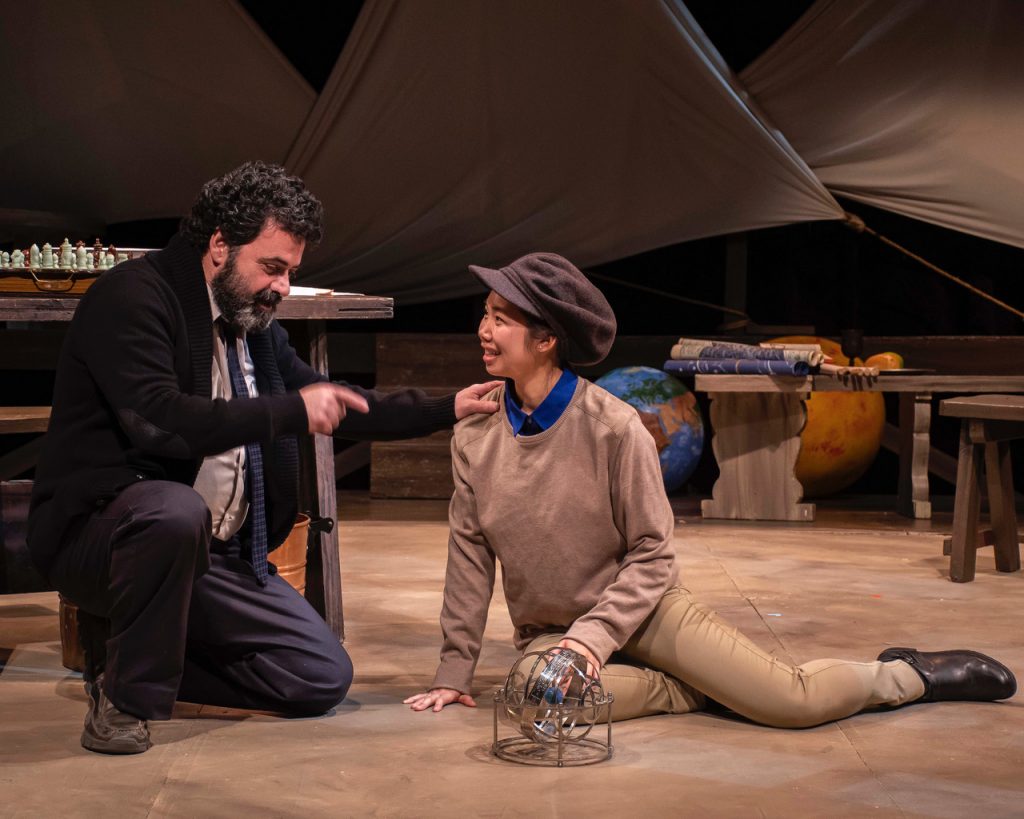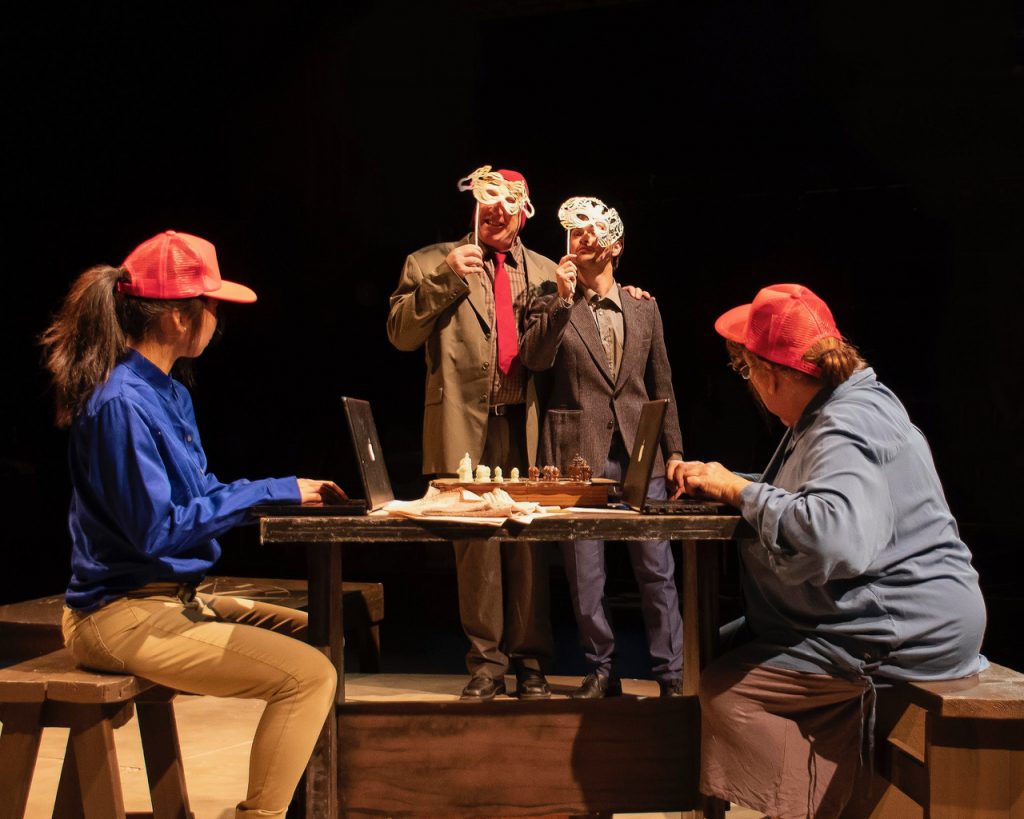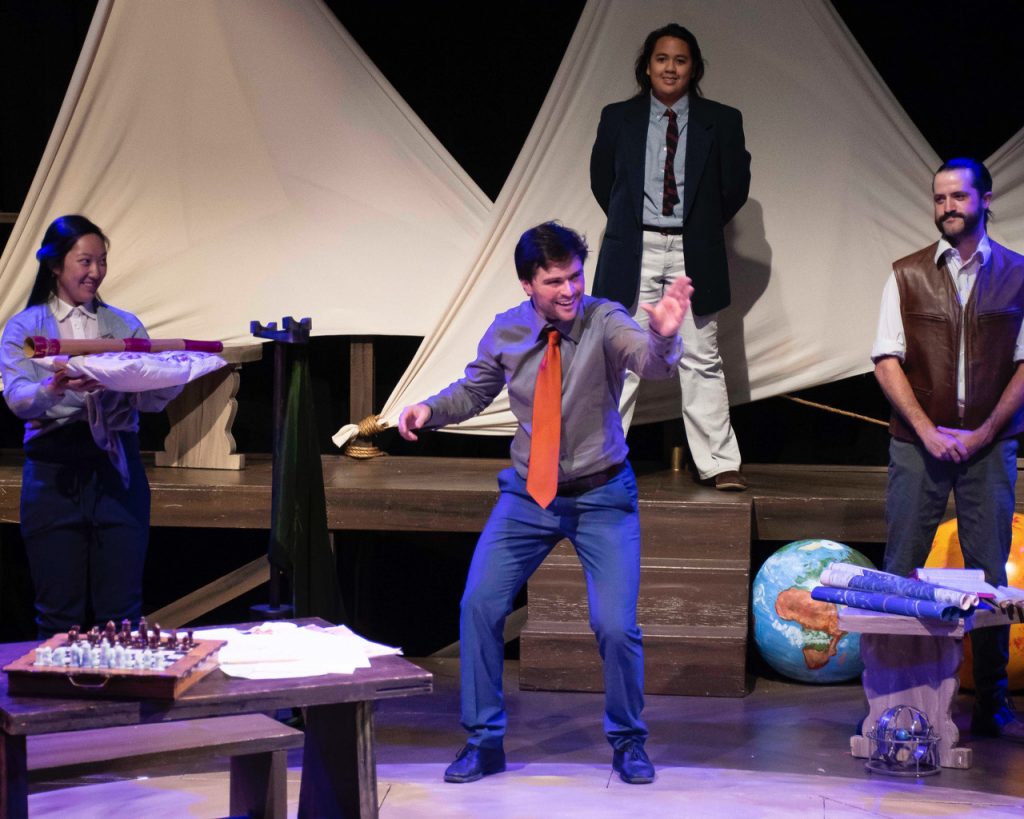
Credit: Nancy Caldwell
At the Jericho Arts Centre until September 30, 2018
Tickets from $22 at 604-224-8007/www.unitedplayers.com
Posted September 9, 2018
British playwright David Hare has his way with Bertolt Brecht in his adaptation of The Life of Galileo and while the result is less than satisfying it reveals the perils that face those who contradict commonly held beliefs.
Early in the 17th Century, physicist, astronomer, philosopher Galileo Galilei risked torture and execution by the Catholic Church for his research into the nature of the solar system. Brecht himself fled pre-WWII Germany because of his subversive political views. In our time and until very recently, those who warned us of the devastating effects of global warming were mocked, even called enemies of the people. Radical thinking has its risks and The Life of Galileo is as much about intellectual freedom as it is about Galileo.

Credit: Nancy Caldwell
Brecht’s plays, including Mother Courage and Her Children, The Caucasian Chalk Circle and The Threepenny Opera, are notoriously difficult to pull off in spite of their seeming simplicity. And there’s Brecht’s verfremsdungseffekt, the so-called ‘alienation’ or distancing effect that’s supposed to prevent us from suspending our disbelief and to force us to look critically at the debate the playwright posits. There are no heroes in Brecht, only characters caught up in the turmoil of their time. From Brecht’s notes on The Life of Galileo he writes, “One can scarcely wish to only praise or to only condemn Galileo.”
To keep the distancing effect working, Brecht showed the ‘guts’ of production: all his actors remain on stage all the time; costume changes – when there are any – take place in full view; scenes are announced on placards as the play progresses; backstage – with its ropes, tools and ladders – is often evident; and there is music – sometimes at odds with what’s happening.
Director Michael Fera adheres to some of Brecht’s techniques. However, actors not actively participating in scenes are so much off to the side and in the shadows, much of the audience will be unaware of their presence. Music in this United Players production seems to come and go so incidentally that it may as well not be there at all.
Almost thirty characters are reduced to seven who are multi-cast. Galileo alone is played by one actor, Michael Vairo. Consistent with Brecht’s own notes on the character, Vairo appears like “a powerful physicist with a tummy on him, a face like Socrates, a vociferous, full-blooded man with a sense of humour.” Unfortunately, Vairo reaches a dramatic peak fairly early and stays there for much of the play: loud and full of bombast.
With the exception of director Fera, this is a non-professional production and, Brecht’s plays being as difficult as they are, I kept wondering what a fully professional production might look like. However, it’s early in the run and this production might yet find its way. Helen Volkow, Aidan Wright, Richard Hersley, Matt Loop, Alesandria Mentari, Chelsea Huang and Trisha Li complete the cast.

Credit: Nancy Caldwell
Simple, effective set design with mediaeval-style furniture is by Todd Paaker. Harika Xu lights the set and provides projections on three, upstage ‘sails’. Shadowy and sepia-toned, the show is handsome.
One audience member remarked the she felt the actors did not understand the play. And that’s understandable. Over time (1938-1955) Brecht worked and re-worked the play, altering the script to suit the times. More significantly, history is unclear as to the motivation behind Galileo’s repudiation of a lifetime of science. What we cannot know is whether he denied the truth of his findings so he could go on with his research in exile or whether the terrors of the flesh undid him. Brecht leaves it open.
The Life of Galileo is long and wordy, running more than two hours. It’s surprising that David Hare – who claims this is a ‘pared down’ adaptation, didn’t do more paring. Galileo’s experiments with surface friction, for example, don’t seem material to what is the most interesting aspect of the play: how do politicians, the Church and the common man deal with ideas that turn their world view upside down?
Today, the obvious parallel is climate change. In the play, Brecht gives Galileo a cautionary couple of lines that resounds across the ages: “He who does not know the truth is an idiot. But he that knows it and chooses to deny it, is a criminal.”
Where does that leave Galileo? Where does that leave us?

